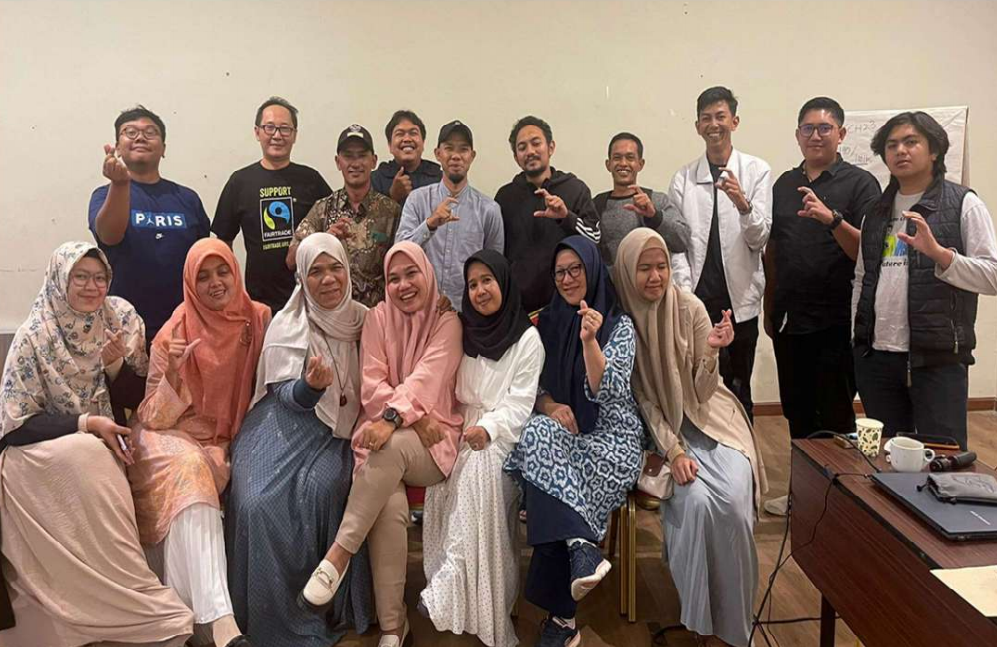Trading your products in the world market opens doors to a vast customer base, fostering economic growth and diversification. Engaging in international trade not only boosts revenue but also fosters cultural exchange, driving mutual understanding and collaboration on a global scale. In 2022, Fairtrade Coffee School (FTCS) was conducted virtually through Vuna Coffee Consultant, covering two topics:
(1) Green coffee trading fundamentals
(2) Digital market access & client engagement.
Recognising this, Fairtrade NAPP facilitated by Fairtrade Coffee School, conducted a hands-on refreshment training in the form of a two-day physical workshop for the Fairtrade Certified Coffee Producer Organization in Indonesia. Despite difficulties experienced by students in participating in the learning through the virtual platform, the contents of the training were well respected, as it provided strong fundamental knowledge and skills on how the Small Producer Organizations (SPO) can properly prepare their capacity to be successful in managing green coffee trading and how to develop business communication skills. The sessions covered Coffee Green Trading Fundamentals and basic digital marketing for channel development. The training was successfully led by Fairtrade NAPP’s coffee and business development staff, with valuable support from the country program consultant. 21 representatives from 10 Small Producer Organizations actively participated in the training. Throughout the two-day training, a comprehensive range of topics was covered to enhance the participants’ understanding of coffee trading.

Day 1:
The first day of the training commenced with an introductory session aimed at fostering mutual understanding among participants. This included activities to help individuals get to know each other, followed by the establishment of objectives and expected outcomes for the training. The morning progressed with Session 1, focusing on the evaluation and forecast of the previous harvest season. The mid-morning to early afternoon was dedicated to Session 2, delving into purchasing strategy. After a break, the training continued with Session 3, where participants were introduced to the commodity futures market, green coffee contracts, and sales strategy. The day concluded with a summarization of key points and the distribution of homework assignments, tasking participants with delivering harvest evaluations and forecasts for the following day’s discussion.
Day 2:
The second day kicked off with group presentations, providing an opportunity for collaborative sharing of insights and perspectives. Following this, Session 5 delved into price risk management, equipping participants with essential tools for navigating market uncertainties. Session 6 conducted centred on establishing governance structures essential for a successful green coffee business. After a break, the training resumed with Session 8 in the afternoon which addressed the relevance and timing of digital marketing assets, along with discussions on the types of assets needed. The day concluded with a holistic exploration of vital aspects, ensuring participants were well-versed in the multifaceted landscape of coffee trading.
This had a great impact on the participants. Focused on coffee trading, the training equipped these participants with the necessary skills and tools that enable them to effectively trade coffee in the global market. During our discussions, participants shared that this kind of training should happen more
often. The training provided knowledge, information, and skills to understand key structures in green coffee trading as given below:
(1) How to evaluate harvest evaluation.
(2) Forecast for the next harvest.
(3) Develop a strategy for purchasing or collecting coffee harvest from members.
(4) Develop a strategy to prepare a sales plan.
(4) Practical insights into the type of price fixation for the coffee harvested.
(5) Understand the ways to mitigate price risk.
(6) Develop a governance structure needed to execute the plan.
(7) Analyze the ways of using digital tools for marketing.
(8) Understanding Coffee commodity future.
(9) Understand the importance of preparing samples professionally.
The two-day hands-on training conducted by Fairtrade NAPP, in collaboration with Fairtrade Coffee School, stands as a pivotal step in empowering Small Producer Organizations in Indonesia’s coffee sector. The comprehensive agenda covered crucial aspects of coffee trading, from historical contexts to digital marketing strategies. The participant’s active engagement and positive feedback highlighted the practical impact of the sessions. This training not only imparted knowledge but also instilled vital skills for navigating the complexities of global coffee markets. As participants expressed a desire for more such initiatives, the success of this program underscores the importance of ongoing training to foster sustainable growth in the international trade landscape.
Testimonials:
“This training is important. Our cooperative has been established for 8 years; this is the first time we received this kind of training with regards to Business. It is important to note that such training needs to be conducted at least twice a year.” – Rizkani Ahmad, Koperasi Kopi Wanita Gayo.
“Thank you for NAPP, for the last 2 days, I learned a lot about how to prepare an organization to do business. First, I learned a lot about what we need to consider when developing a sales contract, and also what we need to consider to set up healthy and functioning governance. – Fadli Ranggayo, Koperasi Serba Usaha (KSU) Sara Ate, Indonesia.




